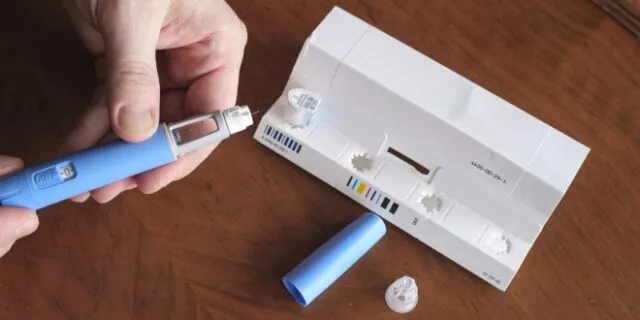For years I hid under the premise of someone who just had a “big sweet tooth,” but it was more than that. It was a monkey on my back that couldn’t be silenced and demanded an unhealthy amount of my daily attention. I knew what I should be eating, but much of my day I thought about eating treats and I wrestled with trying to eat them “in moderation.” I loved to bake and it was nearly impossible not to nose dive into the dough and all the leftovers, which would kick off a cycle of shame and discouragement.
Out of desperation, I tried the Whole30. It took me two tries, but my first successful Whole30 was the first time I ever felt in control and was the longest I had gone without a treat. It helped me realize I can get through stressful situations without soothing with sugar. Whole30 taught me to build my plate in a way that truly kept me satiated and helped minimize my cravings. It taught me how to nourish myself outside of the kitchen with movement, prioritizing sleep, journaling, and creating intentional time to reflect and connect. Whole30 helped me realize my cravings weren’t actually about food. As Melissa Urban puts it, I was craving a connection or rest, not a cookie.
– Autumn Michaelis, Whole30 Endorsed Cookbook Author
As we read in Autumn’s story, getting out of the sugar habit cycle, particularly when experiencing stress, can be life-changing and empowering. It’s also a very common experience to know just what you “should” be eating, but still go for the sweets anyway. There’s a very strong physiological reason as to why we want to eat sugar and carbohydrates when we are feeling stressed. Understanding this can help offer a more compassionate perspective when it comes to helping you decrease your overall consumption of sugar as part of your Food Freedom plan.
What’s happening in my body?
When you feel stressed or anxious, a cascade of hormones are released causing a variety of physiological responses in our body (increased heart rate, breathing, slowed digestion, etc.). Another chemical response that occurs is the release of a specific neuropeptide that literally increases your desire to eat sugar and carbs. In addition, our hunger hormone (called ghrelin) increases as we are experiencing the anticipation of stress.
This means that when stressed, we are biologically programmed to eat sugar and carbs, and our body is nudging us to eat them because we are also feeling hungrier.
In addition, after consuming food with sugar, our stress response actually dampens. Sugar helps to decrease the perceived feelings of stress because it lowers the circulating hormones responsible for making us feel stressed. What this tells us is that during these moments, it’s not a matter of simply having enough willpower or discipline to not eat these foods.
Willpower or discipline could work if not for our biology trying to nudge us towards consuming more sugar and carbs. This alone provides us with a perspective that sometimes, sugar is functional and it works to help us feel calm, in the short term. But what about the long term?
The kind of results indicated in this anecdote including satiety, minimizing cravings, and engaging in other positive health-related behaviors outside of one’s diet is directly related to increasing one’s intake of nutrient-dense foods, with a particular focus on lots of fruits and vegetables. Especially in combination with increased self-awareness and reflection, these behaviors can go a long way towards minimizing the stress-plus-cravings cascade.
How Whole30 Helps Calm Your Sugar Cravings
The Whole30 specifically helps you bust out of those sugar cravings because you are replacing sweet, nutrient-poor foods with foods that are much more satisfying from a nutritional perspective. Foods complete with vitamins, minerals, healthy fats, protein, and fiber help to keep us satisfied, decreasing the need for additional calories including sugar.
In addition, because this is a learned behavior, this also means it can be unlearned. The Whole30 allows you to become more reflective and curious about what is occurring when you notice that you are craving a specific food. When you become more curious, you can become more objective, and that allows you to start understanding what the craving is all about–the underlying emotions behind it, the self-care that might serve you better, and the long-term benefits of choosing another way to self-soothe, show yourself love, or relieve anxiety.
5 Ways The Whole30 Calms Sugar Cravings
- Whole30 prioritizes nutrient-dense foods.The meal template encourages protein, vegetables, and healthy fat which help regulate appetite. Replacing nutrient-poor, highly processed foods with nutrient-dense minimally processed and whole foods helps reduce sugar cravings by increasing satiety.
- Whole30 promotes blood sugar regulation. Because of its focus on nutrient-dense whole foods, Whole30 helps your blood sugar levels stay within an optimal range with fewer spikes and crashes. Balanced blood sugar means you’ll likely have fewer “hangry” feelings or intense desires to impulsively grab a food or snack.
- Whole30 promotes self-awareness. Whole30 allows you to become more reflective and curious about what is occurring when you notice that you are craving a specific food. With curiosity comes the ability to be more objective, allowing you to understand the underlying emotions and psychology behind why you may be craving a particular food.
- Whole30 isn’t just about food. The program recognizes the importance of self-care from an emotional eating perspective. Learning to dig deeper as to why you feel the way you feel and ask yourself, ‘is food or alcohol really what I need?’ allows you to make different, more compassionate choices in the moment that will better serve your mental and physical health.
- Whole30 acknowledges the power of community. Community support is integral to helping you follow through with the hard work of being consistent. Research has demonstrated that community support increases adherence to health-supporting behaviors.
I used to wonder if I would ever be able to bake or have treats in the house without it being that constant struggle to eat them all, like maybe I wasn’t built that way. Whole30 and my Food Freedom work gave me the tools to get that – a peaceful relationship with food. I now have the confidence to nourish myself well, without guilt or shame, and can include the foods I love without feeling out of control. To me, that’s truly food FREEDOM.

















